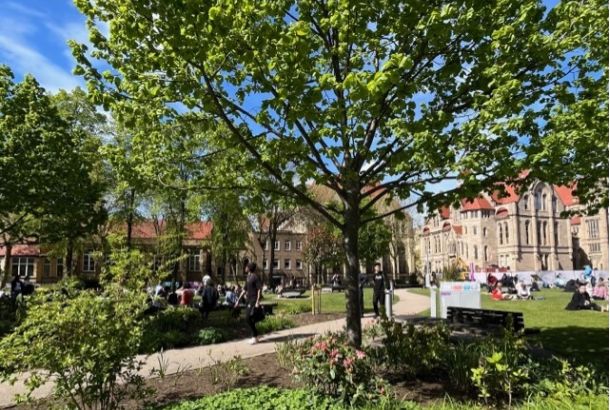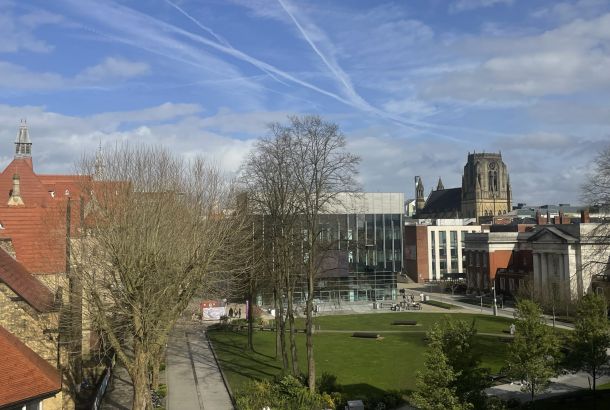Challenges facing international students at the University of Manchester: Where do we fit in?

Words by Beatrice Timken
Up to the present
Britain’s history is built on its many ‘eras of migration.’ First emigration, sending settlers to colonise much of the world from the late 15th century onwards. Just before World War One, the empire ruled over 400 million people. Later, immigration occurred during the Windrush era, when Britain sought to receive migrant workers from is colonies to work across many industries.
But now, Brexit has now closed off many routes to migration, making it more difficult for Brits abroad and migrants alike to come and go. The current bordering regime driven by the Conservative government has increased restrictions; as Rishi Sunak pledged as one of his top five targets, the Conservative’s aim to ‘Stop the Boats’ against unlawful migration has paved the way for the Rwanda plan, which plans to offload migrants on the small east-central African country which is still recovering from recent genocide.
Given England’s colonial history and the present migration landscape, it is unsurprising that student migration also has a conflicted history. Starting with an open call for students from abroad, the government set a target to draw 600,000 international students annually by 2030. With that number far surpassed and political pressure driving border closure, Britain has begun increasing restrictions on international students. The crackdown has affected undergraduate visas and spurred threats to repeal post-grad visa schemes, aiming to minimise students coming with dependents.
International students on shifting sands
International students face a wall of restrictions from the government, while over the past few years, universities are recruiting them more heavily. Across Britain, higher education institutions are fiscally stretched, driving them to recruit internationals to supplement their declining funds; as one Guardian analysis demonstrates, a fifth of universities’ income is generated by international students. As such, many feel that international students have been unfairly granted acceptance to elite universities as ‘cash cows’ rather than students of merit, as they pay between £38,000 per year for undergraduate courses and £30,000 annually for postgraduate courses.
The proliferation of education recruitment companies, brokers, and their agents have come under fire for hawking students with, as The Sunday Times reported, allegedly low academic qualifications to well-accredited universities. However, this reporting has been debunked by findings that suggest that unfair comparisons were made between requirements for non-degree courses and students attempting to enter by typical undergraduate course routes. Likewise, records show that international and home student numbers have grown on a roughly similar trajectory, which does not point to home students losing opportunity to their international counterparts.
Despite confirmation that internationals have not affected the prospects of local students, there is still animosity towards internationals. Although this frustration may be directed at the global community, its root cause is deeper and closer to home. The derision may partly be due to the plight of higher education in England as it becomes more popular and desirable in the job market while being less accessible and offering fewer benefits for higher fees. With rising tuition and the value of degrees sliding, UK education is in peril. The current system drives home students’ frustration as they receive less than their parents’ generation, yet pay more.
Although it may not be the fault of internationals, the state of UK education requires more consideration for future development. As current educational paralysis is paired with restrictive and xenophobic policies from the Conservative government, international students are both, paradoxically, sought after and excluded from higher education in the UK.
Into the University
Looking around Manchester’s libraries and the Students’ Union, you can see that many students speak and read in other languages and wear fashion styles from across the world. This internationalising shift is undoubtedly changing the University’s atmosphere.
Although I may dress and speak similarly to my British peers, I arrived at the University of Manchester after applying from a McDonald’s parking lot in America. As an American, I didn’t have a road map for the arduous process of obtaining a visa or meeting British people for the first time during COVID-19. I took a night flight to London with only four other passengers, quarantined for two weeks, and arrived on campus with a duffel bag.
Three years later, I’m graduating after being admitted to a dual Master’s program at the London School of Economics and Columbia University in New York. During my time at Manchester, I was lucky to have almost all my friends be home students who could show me life in the UK across multiple cities. Likewise, having a social degree made it easy for me to assimilate, make friends, and enjoy the best of Manchester. I am immensely grateful to have experienced University life here.
However, the reality can be very different for other international students. A French alumna who graduated from Manchester’s Law and Criminology course last year said she hadn’t felt connected to University life “because British and international students tend to separate.” She said “I was… made to feel like an international,” and this feeling of being set apart from, and outside to, the ‘British norm’ can be a painful reality for many students from abroad.
Similarly, an American Master’s student told me “I didn’t consider that the majority of students would either have access to loans or be financed by their parents.” As a result, she felt lonely working and trying to keep up with her life at University.
International students also traverse extra hurdles to reach the UK in forms which home students wouldn’t necessarily even consider. Using adaptors for all of your plugs can sound exhilarating while on holiday, but when your plugs never fit, and you find yourself carrying around large charging blocks, it makes you stand out and often feel like an outsider.
Similarly, as Britain’s ‘hostile environment’ has compounded migration, many simple things are made difficult, such as getting a sim card and a cell plan, which requires a bank account; however, the bank account needs a sim card. In my first year, I remember passing back and forth between EE and Lloyds at least five times before receiving help.
Inside the university, these students also face unique challenges; even though the university may want international students, the lives of these students are made difficult by many variables. One Korean student described how “There is… a large Chinese population on campus, which is great but can sometimes feel exclusive. I find it very difficult to connect.” She explained to me, “It doesn’t feel like the University cares about me as an individual because this kind of barrier is always overlooked.” She added, “They are more worried about the money recruiting Asian students might bring them.”
International students are under much more scrutiny, yet they rarely receive the same attention from the university. A Spanish student in her final year studying Philosophy, Politics and Economics said, “I know how to speak English perfectly, coming from a bilingual family, but before Uni, I had never done an essay in English.” She wished, with the number of internationals, that the University would offer more essay-writing support. She said, “I was lucky to be raised bilingual, but I can’t imagine what it might be like for other students.”
The visa check-in process has also been a key issue. A Thai undergraduate student I talked to said that the newly implemented visa check-in process is “incredibly inaccessible for disabled international students like me.” She felt like so much more could have been done to help her navigate University systems. It is infrastructural deficits like these leave international students wondering if they are wanted for their merit or merely to turn out their pockets.
There’s no denying that in a diverse city like Manchester, its reality is very international. But, that raises a cadre of questions, including what we want our education to look like, how we want it funded, and who we want to welcome into British institutions. The answers we choose are critical for home and international students alike.







